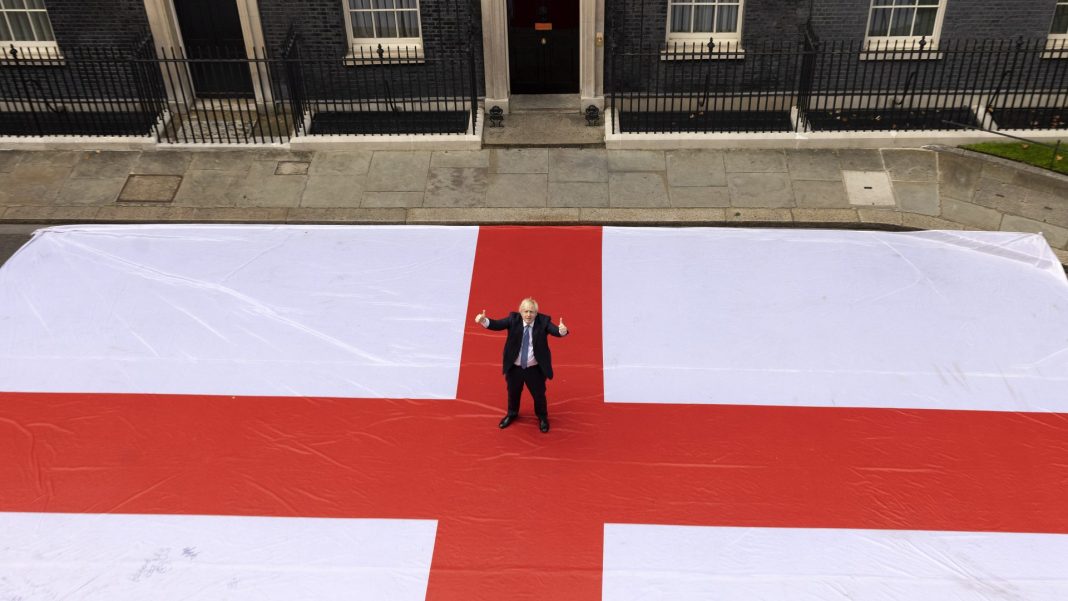I only really know the date of St George’s Day because it’s two days before my sister’s birthday. Beyond hazy primary school memories of dragons and knights, the day had passed me by for nineteen years now with little significance.
The flag has had a greater prominence. Despite lacking the legal backing that most national flags possess, the St George’s Flag has been adopted as England’s emblem. Red crosses have been used by English soldiers since the thirteenth century. Likely snaffled from the Genoese, the English have done a good job in convincing everyone that they have the primary claim to it. Nearly 300 years ago, the monarchy stopped paying a fee for the use of the cross, and since then we’ve exercised relatively consistent usage of the symbol.
Proudly hung up every World Cup and bashfully drawn in before the final; in my sleepy rural neighbourhood it nearly exclusively belongs to sports fans. Being English is a relatively sports related phenomenon, and even then, we’re British when Andy Murray’s playing. If you asked for ‘the nation’s flag’, you’d be pointed to the Union Jack. That’s the flag hung by residents intent of displaying their patriotism or filling a space in a summer fayre flyer.
To hang the St George’s flag spontaneously would be odd. It wouldn’t be deemed racist or bigoted, just quite intense. We know we’re in England. The action comes across as needlessly political, and only a few feel the need to emblazon their driveway with party signs every election. We live in a nation where the majority of the population engages in politics within their homes and at the polls, if that. There simply isn’t much reason to display it. So nobody does.
The flag is, therefore, mentally relegated to its main users, the far right. When the English Defence League parade it around beside signs reading “never submit it Islam” and “England: love it or leave it”, it’s hard to form a positive view. I’m not alone in this, a recent YouGov poll concluded over a quarter of adults have a negative view of those who fly the St George’s flag, this figure jumps to 37% for under 25 year olds.
The use of the St George’s flag is inherently political. English nationalism, rightly or wrongly, occupies a different space to its Scottish and Welsh counterparts. In the public consciousness, left-wing beliefs and nationalist ideals seem somewhat incompatible, despite their concurrence over the borders.
This is not to say there haven’t been attempts. Labour campaigned on the issue of English devolution in 2015. Nationalism has deep roots within the working class, who have historically voted for more liberal candidates than their upper and middle class counterparts. The shift towards a right-wing working class was no doubt influenced by the left-wing departure from nationalism.
There is also, as often seems to be the case in England, a class angle to all of this. It is the upper classes who are immune to politics, who are truly apolitical. The working classes rely more deeply on the decisions of those in power. Middle class aspirations cannot truly part with these worries, but they can separate themselves from the parts of governance less critical to them, namely, nationalism.
It becomes quite simple then. The middle class don’t want nationalism, and the parties want their vote. As a result mainstream parties, particularly Labour have left nationalism be. It becomes relegated to the fringes, nationalism is made more extreme. As such, the return to nationalism by Labour can be explained. The party can claim a sizeable portion of the middle class, but they need the working class to win, and hence the St George’s flag appears.
The St George’s flag is the flying banner of nationalism, despite Keir Starmer decrying the need for symbols. It is inherently linked with the kind of glaring nationalism that the middle classes shy away from. The argument can be made that the Conservative vote, in part, is being lost by the treatment of migrants. Reminding people of their privilege of being born English is uncomfortable. Flying the St George’s flag, bellowing that we should be proud to be English, just seems brash, ignorant and boastful.
To reclaim the flag would be to embrace the idea that England has its merits. England is a comparatively brilliant place to live, very few would deny it, but very few would openly pronounce it all the same. Showing the St George’s flag is garish, a flashback to a time when all that most English people had to be proud of was the flag. It has developed since then. The nation has the capacity for great schools, free healthcare and innovation. We have so much more to be proud of than a flag commemorating ‘Georgios of Lydda’, a man who never even stepped foot here. It is for that reason, then, that I do not believe the St George’s flag will be successfully reclaimed, at least any time soon.


